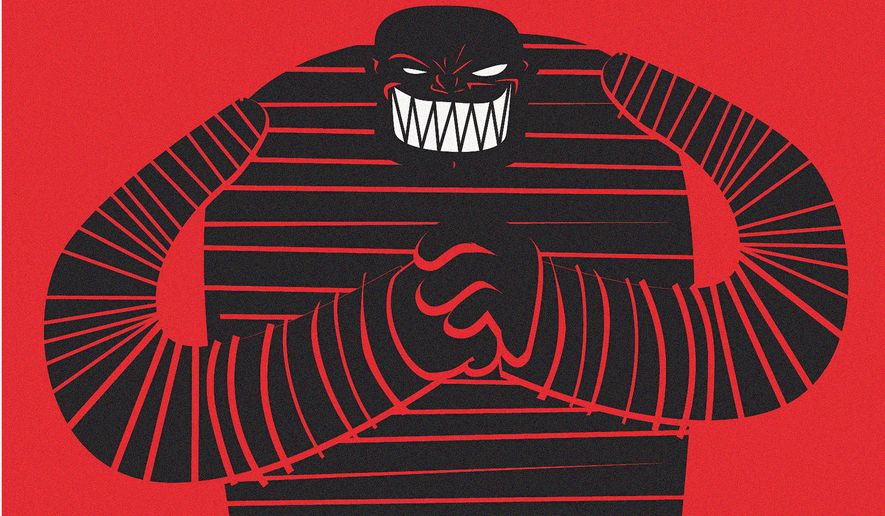OPINION:
A friend of mine, a retired Marine colonel, has spent the past few months in Ukraine, observing the horrors inflicted on the Ukrainian people by Russian troops. On the basis of what he has seen, he asks whether Russia should be labeled a terrorist state.
Last month, the Senate unanimously passed a nonbinding resolution that Russia should be labeled a state sponsor of terrorism due to its invasion of Ukraine and the conduct of its forces there, as well as its conduct in Syria and Chechnya. (Syria’s regime, already labeled a state sponsor of terrorism, is guarded by Russian troops.)
Secretary of State Antony Blinken has said that imposing such a designation would be redundant due to the sanctions already imposed on Russia. But those sanctions have neither stopped nor even slowed the Russian war against Ukraine.
Designating Russia as a state sponsor of terrorism would be a huge blow to Russian prestige. It would also go much farther than the current sanctions by barring some trade with it and sanctioning companies and nations that do business with it. Germany and other nations that buy oil and gas from Russia would find such a designation very inconvenient which is more than enough to cause Mr. Blinken to go weak in the knees.
U.S. law defines a state sponsor of terrorism as a nation that repeatedly sponsors international terrorism. The fact that Russia employs the mercenary troops of the Wagner Group to terrorize many nations should satisfy that criterion.
The concept of a terrorist nation is broader. It should include those who commit acts of violence to intimidate a defined group of people for political purposes. Vladimir Putin has been Russia’s president since 2000, with a four-year interlude from 2008 to 2012 when his minion, Dmitry Medvedev, supposedly replaced him. Mr. Putin’s regime has committed a great many acts of terrorism, some of which were international but most were against Russians in their own country.
Assassinations by Russian government agents are commonplace. Former Russian State Security (FSB) agent Alexander Litvinenko had threatened to release facts embarrassing to the FSB. He was murdered in 2006 in London, almost certainly by Russian agents, using radioactive Polonium 210. The European Court of Human Rights determined that Russia was responsible for Litvinenko’s death and a U.K. public inquiry determined that Mr. Putin probably approved it.
In 2018 Russian agents attempted the murder of Sergei Skripal, a former colonel in Russian military intelligence (and probable double agent for the British) and his daughter, with the Russian-manufactured nerve agent Novichok. Police have identified three Russians as the probable perpetrators.
Intimidation of the press is accomplished by murdering reporters who don’t follow Mr. Putin’s line. The best example is that of Anna Politkovskaya, who was investigating the 2004 school massacre in Beslan, Chechnya, in which more than three hundred people died, including almost 200 children when their school was assaulted by Russian troops. Politkovskaya was reportedly poisoned in 2004 to prevent her reporting on Mr. Putin’s involvement, but she survived. She was shot to death, allegedly by Russian FSB agents, in 2006 while still pursuing that story.
According to the Committee to Protect Journalists website, at least 44 journalists have been murdered in Russia while Mr. Putin has been in power.
And then there is Russia’s invasion of Ukraine. Russia has made war crimes its policy, intentionally attacking hospitals and schools and besieging many civilians.
Russia is committing ethnic cleansing by forcibly deporting thousands of Ukrainians to Russia. The State Department estimates that between 900,000 and 1.2 million Ukrainians have already been forcibly deported to Russia, including about 260,000 children.
Russia’s military actions in Ukraine — at least those intentionally against civilians — are terrorist actions.
My friend — let’s call him Jim, which is not his real name — was in Ukraine from mid-March to mid-June. He is old enough to know better, but — God bless the Jarheads — he sometimes joined in the fighting against Russian forces.
Jim has seen a lot of death and destruction in combat, but what he saw in Ukraine shocked even him. He said that the sort of horrific Russian atrocities in Bucha, which were widely reported by the media, were perpetrated by the Russians everywhere they went.
Jim observed a lot of the aftermath of Russian attacks in the capital city of Kyiv, in Dnipro, in Zaporizhzhia and in many small towns and villages. In Kyiv and Dnipro, Jim was present during many night air raids which targeted civilians. While in Zaporizhzhia, he saw the first evacuees come out of Mariupol, people who had survived the Russian siege of a big steel factory. There were many women and children among them apparently suffering from shock. In his words, it was a “sad, moving sight.”
Jim saw many small towns and villages that had no military value but were nevertheless obliterated by Russian forces.
The Russians, of course, deny all allegations of war crimes. The reality of Russia’s terrorism is plain to see, but nothing is so important that President Biden and our NATO allies can’t ignore it. Russia won’t ignore the weakness of our inaction.
Russia should be designated as a state sponsor of terrorism, joining Cuba, Iran, North Korea and Syria in the distinction that separates them from the civilized world.
• Jed Babbin is a national security and foreign affairs columnist for The Washington Times and contributing editor for The American Spectator.




Please read our comment policy before commenting.